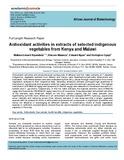Antioxidant activities in extracts of selected indigenous vegetables from Kenya and Malawi

View/
Date
2014-03Author
Wakisa, Lenard K
Mwanza, Benzon
Nguu, Edward
Ogoyi, Dorington
Language
enMetadata
Show full item recordAbstract
Antioxidant activities and phytochemical compounds of ethanol and hot water extracts of 7 selected indigenous vegetable species from Malawi and Kenya were Spectophotometrically determined and evaluated. Their effectiveness were also evaluated by their EC50 values through interpolation from linear regression analysis of their respective data. Generally, ethanolic extracts portrayed high quantities of total phenol, carotenoids and lycopene while hot water extracts showed high ascorbic acid. The highest total phenol (475.88±0.02 mg/g) and lycopene (0.13±0.02 mg/g) were detected in the ethanol extracts of I. batatas and C. gynandria, respectively. In the hot water extracts, the highest ascorbic acid (2.59±0.06 mg/g) and flavonoids (156.43±0.02 mg/g) were from M. esculenta. Dose-dependent antioxidant activities of the extracts were observed. Based on the EC50 values (mg/ml), the hot water extracts were significantly (p<0.05) more effective in all antioxidant activities assayed (DPPH, hydroxyl, superoxide anion radicals and reducing power) than ethanol extracts. It was observed that a single vegetable species did not posses all sorts of antioxidant phytochemical compounds in significant quantities and hence not effective in scavenging all different radicals. A combinatory intake of these vegetables species in sufficient concentrations should thus be recommended to enhance an optimal antioxidant capacity in the body.
URI
http://www.academicjournals.org/article/article1398765156_Kipandula%20et%20al.pdfhttp://hdl.handle.net/11295/81108
Citation
Kipandula, W. L., Mwanza, B., Nguu, E., & Ogoyi, D. (2014). Antioxidant activities in extracts of selected indigenous vegetables from Kenya and Malawi. African Journal of Biotechnology , 13(17), 1824-1834.Publisher
University of Nairobi
